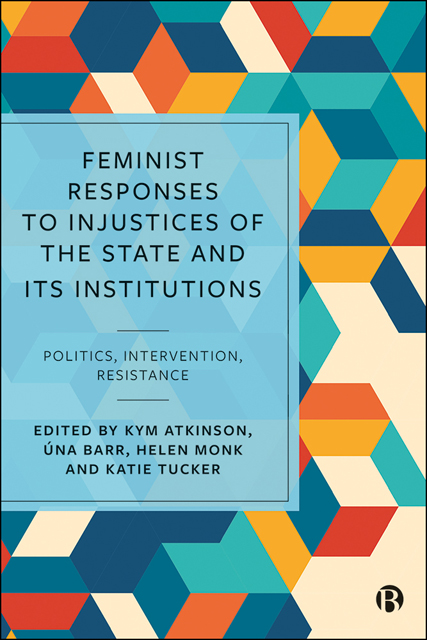 Feminist Responses to Injustices of the State and Its Institutions
Feminist Responses to Injustices of the State and Its Institutions 8 - Constructing a Feminist Desistance: Resisting Responsibilization
Published online by Cambridge University Press: 17 June 2023
Summary
Introduction
Desistance theory, which examines how and why people stop offending, has occupied an increasingly central position in criminological discourse over the past 30 years. More recently, criminal justice policy and practice have witnessed a shift towards the uncritical proliferation of desistance (Gov. uk, 2019; Carr, 2021), which, in turn, has taken an uncritical examination of ‘crime’ and ‘offending’ (Graham and McNeill, 2018). While desistance theory was conceptualized around the experiences of White men (Gålnander, 2019), more recent examinations of the operation of desistance have explored women’s experiences (Rodermond et al, 2016; Hart, 2017a; Österman, 2018; Barr, 2019, Gålnander, 2019). Nonetheless, criminology’s focus on desistance theory is illustrative of its phallocentric occupation and this chapter will discuss the implications of this wilful acceptance in criminal justice policy and practice on the experiences of criminalized women. The chapter goes on to consider an alternative anti-carceral, intersectional feminist way forward which directly challenges the current ineffective theory, policy and practice which dominates not only state responses, but also criminology.
Women’s experiences are subjugated within all areas of criminal justice and criminology. Where they are considered, their experiences are presented as support for traditional perspectives and (neo)liberal reform with emphasis on individual change and responsibilization (Hart, 2017a; Elfleet, 2021). While there has been a relatively recent move to focus on the relational (rather than individualized) aspects of desistance, at least within the literature and some more critical desistance research (Weaver, 2019), what is missing is a truly structural, intersectional feminist analysis. As Anette Ballinger discusses in Chapter 2 of this collection, feminist epistemology is necessary to uncover and rebuild discourses about the reality of women’s experiences and the gendered social order. It is also crucial that this feminism is grounded in abolitionist thinking and this chapter will argue that intersectional anticarceral feminist desistance approaches must pave the way forward for both critical criminology and feminist praxis.
This chapter presents three key areas for consideration in building a feminist desistance. First, this chapter will critique the drive of desistance praxis which has perpetually encouraged offenders to (re)enter and engage with ‘conventional society’ and develop and maintain social bonds that will support desistance trajectories.
- Type
- Chapter
- Information
- Feminist Responses to Injustices of the State and Its InstitutionsPolitics, Intervention, Resistance, pp. 161 - 179Publisher: Bristol University PressPrint publication year: 2022


